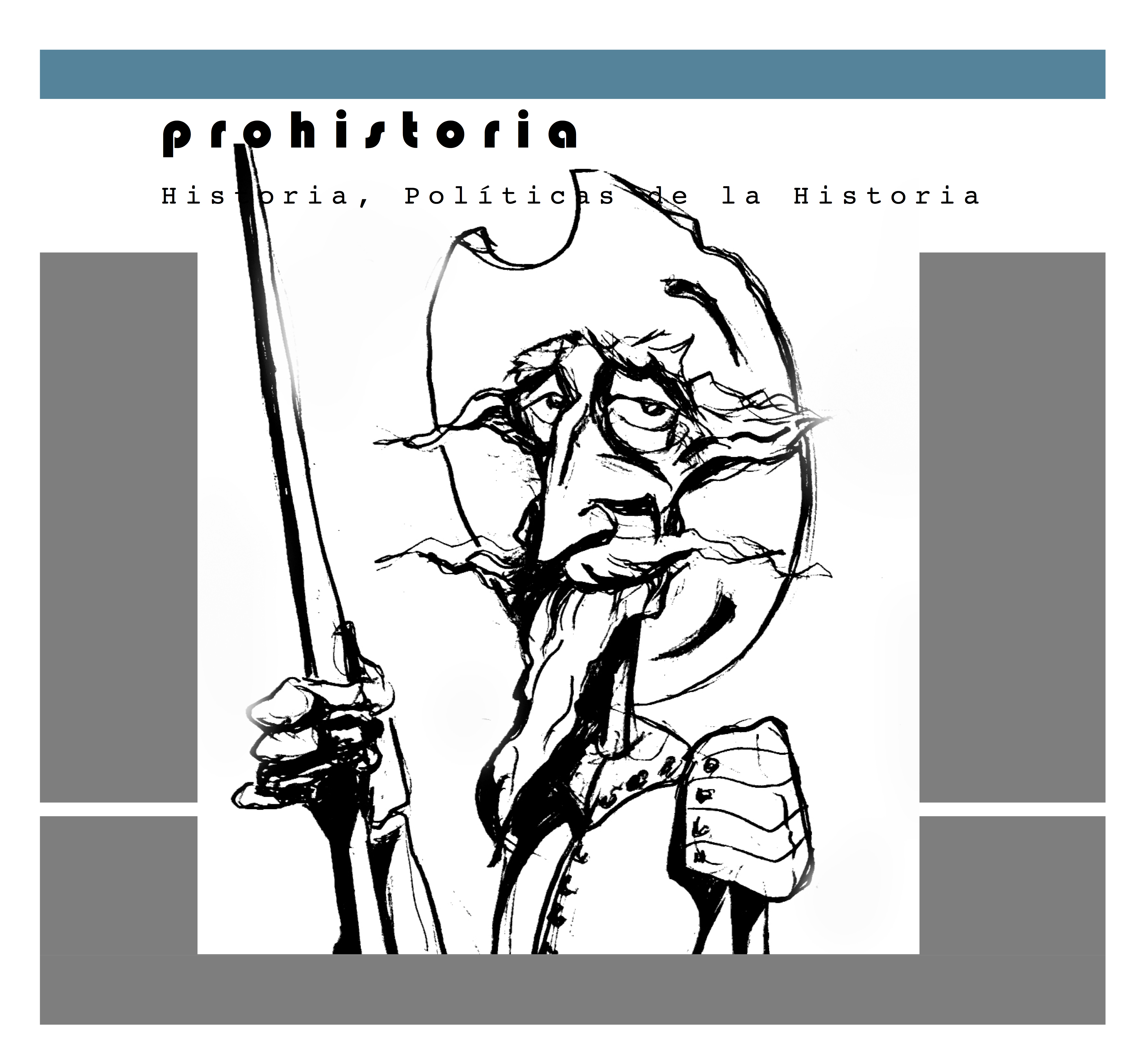The Organization of Military Violence in the 21th Century
DOI:
https://doi.org/10.35305/prohistoria.vi35.1413Keywords:
Coercion, Ideology, Group Solidarity, Organizational Power, Military Violence, WarAbstract
The essay analyzes the sociological foundations of military violence in the 21st century. The first part of the article engages critically with the three dominant contemporary approaches in the study of organised violence: a) the decline of violence perspective, b) the new wars theories and c) the technological displacement approach. It argues that despite their obvious merits, these three perspectives do not provide an adequate interpretation of recent social change. In particular, it contests their emphasis on the radical discontinuity in the character of the contemporary military violence when compared to the previous historical periods. Hence, to remedy this –in the second part of the article– it develops an alternative, a longue durée, sociological interpretation centred on the role of organisational, ideological and micro-interactional powers in the transformation of military violence. In contrast to the three dominant perspectives, it argues that the 21st-century organisation of military violence has changed but it still exhibits much more organisational continuity with the last two centuries than usually assumed. More specifically, the argument centres on the long-term impact of the three historical processes that have shaped the dynamics of military violence: the cumulative bureaucratisation of coercion, the centrifugal ideologisation and the envelopment of micro-solidarity.
Downloads
References
Alperovitz, Gar (1995). The Decision to Use the Atomic Bomb, New York: Albert Knopf.
Arkin, Ronald C. (2011). “Military Robotics and the Robotics Community’s Responsibility”, en Industrial Robotics, 38 (5): 1973.
Bauman, Zygmunt (2002). Society under Siege, Cambridge: Polity.
Bauman, Zygmunt (2006). Liquid Fear, Cambridge: Polity.
Bender, Jeremy (2015). “‘They’d love to do damage’: The FBI says ISIS wants to go after one of America’s biggest vulnerabilities”, en Business Insider UK. Disponible en: http://uk.businessinsider.com/isis-and-hacking-us-power-grid-2015-10?r=US&IR=T.
Bourke, Joanna (2000). An Intimate History of Killing, London: Granta.
Broadbridge, Anne (2008). Kingship and Ideology in the Islamic and Mongol Worlds, Cambridge: Cambridge University Press.
Childs, John (2005). “The Military Revolution I: The Transition to Modern Warfare”, en Townshend, Charles (ed.) The Oxford History of Modern Warfare, Oxford: Oxford University Press.
Cirillo, Pasquale y Taleb, Nassim (2017). “On the Statistical Properties and Tail Risk of Violent Conflicts”, en Physica A: Statistical Mechanics and its Applications [in press].
Clausewitz, Carl von (1997 [1832]). On War, Ware: Wordsworth.
Coker, Christopher (2013). Warrior Geeks, London: Hurst.
Collins, Randall (2008). Violence: A Micro-Sociological Theory, Princeton: Princeton University Press.
De Landa, Manuel (1991). War in the Age of Intelligent Machines. New York: Swerve Editions.
Della Porta, Donatella (2013). Clandestine Political Violence, Cambridge: Cambridge University Press.
Dolman, Everett (2015). Can Science End War? Cambridge: Polity.
Duffield, Mark (2001). Global Governance and the New Wars, London: Zed.
Elias, Nobert (2000[1939]). The Civilising Process: Sociogenetic and Psychogenetic Investigations, London: Blackwell.
Fazal, Tanisha M. (2014) “Dead Wrong? Battle Deaths, Military Medicine, and Exaggerated Reports of War’s Demise”, en International Security, 39 (1): 95-125.
Foucault, Michel (1975). Discipline and Punish. The Birth of Prison, London: Penguin.
Foucault, Michel (2003). Society Must Be Defended: Lectures at the College de France 1975-1976, New York: Picador.
Fry, Douglas S. (2007). Beyond War, Oxford: Oxford University Press.
Fry, Douglas S. y Sorderberg, Patrik (2013). “Lethal Aggression in Mobile Forager Bands and Implications for the Origins of War”, en Science 341 (6143): 270-273.
Gat, Azar (2013). “Is War Declining – And Why?”, en Journal of Peace Research, 50 (2): 149-157.
Gellner, Ernest (1983). Nations and Nationalism, Ithaca NY: Cornell University Press.
Giddens, Anthony (1986). The Nation-State and Violence, Cambridge: Polity.
Goldstein, Joshua (2011). Winning the War on War: The Decline of Armed Conflict Worldwide, New York: Dutton.
Grossman Dave (1996). On Killing: The Psychological Cost of Learning to Kill in
War and Society, Boston: Little, Brown.
Gudkov, Gennady (2015). “Russian Nomenklatura 5 Times Larger, More Privileged. More Dangerous than Soviet Predecessor”, The Interpreter, October 24, 2015; https://www.interpretermag.com/russian-nomenklatura-five-times-larger-more-privileged-and-more-dangerous-than-its-soviet-predecessor-gudkov-says/
Guthrie, R. Dale (2005). The Nature of Palaeolithic Art, Chicago: Chicago University Press.
Hall, John A. (1985) Powers and Liberties, London: Blackwell.
Hirst, Paul (2001). War and Power in the 21st Century, Cambridge: Polity.
Hixson Walter (2003). The American Experience in World War II: The Atomic Bomb in History and Memory, London: Routledge.
Holmes, Richard (1985). Acts of War, New York: Free Press.
Horgan, John (2012). The End of War, New York: McSweeney.
Kaldor, Mary (2003). Global Civil Society: An Answer to War, Cambridge: Polity.
Kaldor, Mary (2007). New and Old Wars: Organised Violence in a Global Era, Cambridge: Polity.
Kaldor, Mary (2013). “In Defence of New Wars”, en Stability 2 (1):4, http://doi.org/10.5334/sta.at
Kalyvas, Stathis (2001). “‘New’ and ‘Old’ Civil Wars: A Valid Distinction?”, en World Politics, 54: 99-118.
Low, Bobbi (1993). “An Evolutionary Perspective on War”, en Zimmerman, William y Jacobsen, Harold (eds.) Behavior, Culture and Conflict in World Politics, pp. 13-55. Ann Arbor: University of Michigan Press.
Machiavelli, Niccolo (1997 [1532]). The Prince, Ware: Wordsworth.
Malešević, Siniša (2010). The Sociology of War and Violence, Cambridge: Cambridge University Press.
Malešević, Siniša (2013a). Nation-States and Nationalisms: Organisation, Ideology and Solidarity, Cambridge: Polity.
Malešević, Siniša (2013b). “Forms of Brutality: Towards a Historical Sociology of Violence”, en European Journal of Social Theory, 16 (3): 273 - 291.
Malešević, Siniša (2014). “Is War Becoming Obsolete? A Sociological Analysis”, en Sociological Review 62 (2): 65-86.
Malešević, Siniša (2015). “Where does Group Solidarity Come from? Gellner and Ibn Khaldun Revisited”, en Thesis Eleven, 128 (1): 85-99.
Malešević, Siniša (2016). “Nationalism and Military Power in 20th Century and Beyond”, en Schroeder, Ralph (ed) Global Powers: Mann’s Anatomy of the 20th Century and Beyond, Cambridge: Cambridge University Press.
Malešević, Siniša (2017). The Rise of Organised Brutality: A Historical Sociology of Violence, Cambridge: Cambridge University Press [edición en español: (2020) El auge de la brutalidad organizada. Una sociología histórica de la violencia, Universitat de València]
Mann, Michael (1986). The Sources of Social Power I: A History of Power from the Beginning to AD 1760, Cambridge: Cambridge University Press.
Mann, Michael (1993). The Sources of Social Power II: The Rise of Classes and Nation States 1760-1914, Cambridge: Cambridge University Press.
Mann, Michael (2012). The Sources of Social Power III: Global Empires and Revolution, 1890-1945, Cambridge: Cambridge University Press.
Mann, Michael (2013). The Sources of Social Power IV: Globalizations 1945-2011, Cambridge: Cambridge University Press.
Mearsheimer, John J. (2001). The Tragedy of Great Power Politics, New York: W.W. Norton.
Meyer, John; Boli, John; Thomas, George y Ramirez, Francisco (1997). “World Society and the Nation-State”, en American Journal of Sociology 103 (1): 144-81.
Meyer, John; Ramírez, Francisco y Soysal, Yasemin Nuhoḡlu (1992). “World Expansion of Mass Education, 1870-1970”, en Sociology of Education 65: 128-49.
Midlarsky, Manus (2011). Origins of Political Extremism: Mass Violence in the Twentieth Century and Beyond, New York: Cambridge University Press.
Morris, Ian (2014). War! What is it Good For?: Conflict and the Progress of Civilization from Primates to Robots, New York: Berghahn Books.
Mueller, John (2009). “War Has Almost Ceased to Exist: An Assessment”, en Political Science Quarterly. 124 (2): 297-321.
Munkler, Herfried (2004). The New Wars, Cambridge: Polity.
Newman, Edward (2004). “The ‘New Wars’ Debate: A Historical Perspective is Needed”, en Security Dialogue. 35 (2): 173-189.
Pinker, Steven (2011). The Better Angels of Our Nature: Why Violence has Declined? New York: Allan Lane.
Sageman, Marc (2004). Understanding Terror Networks Philadelphia: University of Pennsylvania Press.
Singer, Peter Warren (2009). Wired for War: The Robotics Revolution and Conflict in the 21st Century. London: Penguin.
Singer, Peter Warren y Friedman, Allan (2014). Cybersecurity and Cyberwar: What Everyone Needs to Know, Oxford: Oxford University Press.
SIPRI Military Expenditure Database (2013). http://www.pgpf.org/Chart-Archive/0053_defense-comparison#sthash.cgDq2KLF.dpuf
Smith, Roger W. (1999). “State Power and Genocidal Intent”, en Chorbajian, Levon y Shirinian, George (eds). Studies in Comparative Genocide, London: Macmillan.
Thornborrow, Thomas y Brown, Andrew (2009). “Being Regimented: Aspiration, Discipline and Idenity Work in the British Parachute Regiment”, en Organizational Studies 30 (4): 355-376.
Tilly, Charles (1985). “War Making and State making as Organized Crime”, en Evans, Peter; Rueschemeyer, Dietrich y Skocpol, Theda (eds.) Bringing the State Back In, Cambridge: Cambridge University Press.
Tin-Bor Hui, Victoria (2005). War and State Formation in Ancient China and Early Modern Europe, Cambridge: Cambridge University Press.
Turner, Jonathan (2007). Human Emotions: A Sociological Theory, London: Routledge.
Virilio, Paul (1997). Pure War, New York: Semiotext(e).
Virilio, Paul (2006). Speed and Politics, Cambridge, MA: MIT Press.
Waltz, Kenneth (2008). Realism and International Politics, London: Routledge.
Weber, Max (1968). Economy and Society, New York: Bedminster Press.
White, R. W. (2000). “Issues in the Study of Political Violence: Understanding the Motives of Participants in Small Group Political Violence”, Terrorism and Political Violence, 12(1): 95-108.
Published
How to Cite
Issue
Section
License

This work is licensed under a Creative Commons Attribution-NonCommercial-ShareAlike 4.0 International License.
- Authors retain copyright and grant the journal right of first publication with the work simultaneously licensed under Creative Commons Attribution 4.0 International License.
- Authors are able to enter into separate, additional contractual arrangements for the non-exclusive distribution of the journal's published version of the work (e.g., post it to an institutional repository or publish it in a book), with an acknowledgement of its initial publication in this journal.
Copyright of this issue © Prohistoria. Historia, políticas de la historia



















